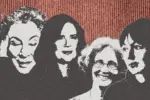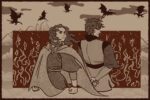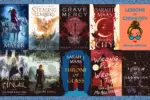Last week, at the age of 88, legendary author Toni Morrison passed away. She is best known for her rich writings that detail the lives of African Americans and incorporate many elements of magical realism.
Toni Morrison’s first book, “The Bluest Eye,” was published in 1970. Her most famous book, “Song of Solomon,” was published in 1977 and won the National Book Critics Circle Award. Later, in 1988, she won the Pulitzer Prize and the American Book Award for her novel “Beloved.” In 1993, she was awarded with the Nobel Prize in Literature.
Her novels are as beautiful as they are enthralling; readers feel as though they must keep turning the pages to devour, slowly, the intricate web of words that Morrison spins into passion, pain and freedom.
Beyond the words she puts on paper, however, Morrison is equally as captivating and eloquent in her speech. In interviews she has had over the past five decades, she has revealed herself to be just as genius of a person as she is a writer. Here are four interviews in which she articulates the world through the point of a pen.
1. Interview with Mavis Nicholson, 1988
https://www.youtube.com/watch?v=UAqB1SgVaC4
In this interview, Toni Morrison talks about her first novel, “The Bluest Eye,” in which a young black girl yearns for blue eyes in order to be regarded as beautiful — the kind of beauty that’s filtered through the lens of whiteness.
On writing, Morrison claims that the book “was one I was not really thinking about publishing, or reviewers or other readers. It was a book I wanted to read, and I couldn’t find it anywhere, so I began to write it.”
This parallels one of her most famous quotes, in which she gives advice to other readers and writers in the world: “If there is a book that you want to read, but it hasn’t been written yet, you must be the one to write it.” She leads by her own actions.
In all her interviews, Morrison has something to say for the way the present is a train moving by the tracks of the past. In this particular interview, she shares her thoughts on how the “residue” of the pain women have been made to feel has stuck:
“We still have to determine how to be complete human beings, how to be responsible to something larger than ourselves, how to be parents, how to be workers, how to be philanthropists, how to take care of and nurture the other, and at the same time how to be this very unique person.”
2. Interview with Charlie Rose, 1993
Along with a hair change, Morrison’s demeanor has shifted greatly between her earlier interview and this one. Of all the interviews listed, this is perhaps the one that could be deemed almost “aggressive.” It is also one of her most famous interviews, as her frank words about racists reverberate with truth even today:
“The racist white person — I don’t mean the person who is examining his consciousness and so on — doesn’t understand that he or she is also a race, it’s also constructed, it’s also made and it also has some kind of serviceability.”
Morrison is talking about the widespread ignorance shared by white people that they are, in fact, a race. Just as blackness and brownness were created to serve a purpose, whiteness was also invented for an opposing purpose: to take a position of superiority.
She continues on, asking:
“…But when you take it away, if I take your race away, and there you are all strung out, all you got is your little self, and what is that? What are you without racism? Are you any good? Are you still strong? Still smart? Do you still like yourself? … If you can only be tall because somebody’s on their knees, then you have a serious problem. And my feeling is white people have a very, very serious problem. And they should start thinking about what they can do about it. Take me out of it.”
The power of her words speaks for itself.
3. Interview with Jana Wendt, 1998
http://https://www.youtube.com/watch?v=WoTELoC8Q0M
In this interview, Toni Morrison has clearly grown into the wisdom that she is now known for. She is calm and poised, without falter. Her speech is slower, making listeners gravitate toward the sound like moths to a bulb. This time, she aims her remarks on racism at the interviewer, which have resurfaced virally since her death.
At 23 minutes in, the interviewer asks if Morrison will ever include white characters in a “substantial” way into her stories. Her response?
“You can’t understand how powerfully racist that question is, can you? Because you could never ask a white author, ‘When are you going to write about black people?’ Whether he did or not, or she did or not. Even the inquiry comes from a position of being in the center and being used to being in the center. And saying, ‘Is it ever possible that you will enter the mainstream?’ It’s inconceivable that where I already am is the mainstream.”
Mic drop.
Morrison makes other incredibly articulate points in this interview, but most notable, aside from her addressing the question earlier, is at 21:40, where she reveals the attitude she tries to maintain when racially-charged events occur.
She states, “I insist on being shocked. I am never going to become immune. I think that’s a kind of failure to see so much of it that you die inside. I want to be surprised and shocked every time.”
This philosophy is utterly important today for many aspects of life. It is an important mindset to try to achieve in a world with increasing levels of violence and destruction. Avoiding that numbness is the key that will drive the change.
4. Interview with Junot Diaz, 2013
http://https://www.youtube.com/watch?v=J5kytPjYjSQ
This is potentially the best interview listed here, in part because it is recent, and Toni Morrison has nothing but pure genius to share with the world, but also because the interviewer is Dominican American author Junot Diaz. His questions are in depth, as he has studied each of Morrison’s novels with great care. His words have a way of provoking Morrison to speak more on certain subjects, and to articulate more finely.
The interview has many incredible monologues from Toni Morrison, which makes the hour and a half a worthwhile commitment. One of her best, however, is at 15 minutes. Before this, Diaz asks her about her time as a publisher before she started writing her own books. She carried the lessons she learned from reading other African American authors and applied them to her own writing as she worked.
“… Being Tolstoy — you’re Russian. And you write for Russians. Not for little colored girls in Ohio. However, it applies. You know, once you take your own area, in your own soil, and dig deep into that, if you’re good enough at it, it’s available to everybody; you don’t have to direct it at a vague audience that you think is perhaps not yours.”
Later, she criticizes the abhorrent white feminism that reigned in the late 19th century and into the 20th within the suffragettes. At 22 minutes, she remarks how, when the feminists started to organize and congregate to discuss the issues they faced, they would be “having these huge meetings about feminism and the power of women, and they’re leaving all their black maids at home.”
This quote exemplifies how powerfully intersectional Morrison’s literature is. Her books are about black men, little black girls and black women all at once. She leaves no one behind in her books, and she left no one behind in her fight to include everyone in her readership.
Toni Morrison’s death is a loss deeply felt by many. Rest in power.
















